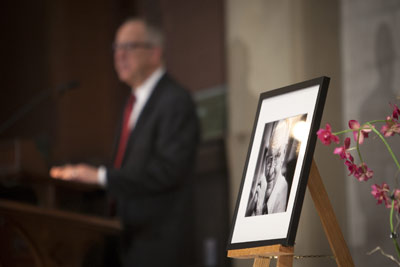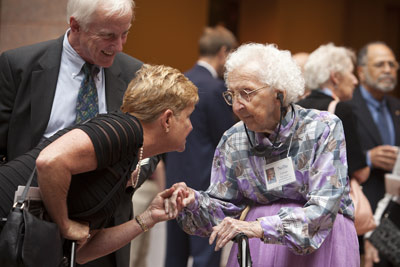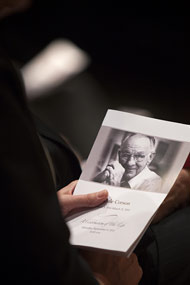Corson remembered as courageous 'true intellectual'
By Anne Ju


For his commitment to protect Cornell's intellectual and academic integrity, to his accomplishments as a physicist, researcher and administrator, to his deep devotion to his family, Dale Corson was celebrated Sept. 8.
A service to honor Corson, Cornell's eighth president who died March 31 at age 97, took place in Sage Chapel. With the doors open to steady rain, the chapel swelled with warm remembrances of Corson and music from the Cornell University Chorus and Glee Club. President David Skorton welcomed those in attendance, including Corson's wife of 73 years, Nellie Corson.
Among Corson's earliest contributions to Cornell's scientific distinction, said Maury Tigner, the Hans A. Bethe Professor of Physics Emeritus, was the Cornell synchrotron, which Corson helped design after coming to campus in 1946 as an assistant professor of physics.
Corson's reputation and legacy are closely linked to his years as a Cornell administrator. He served as president from 1969 to 1977, leading the campus through a tumultuous period of anti-war demonstrations and student protest.
"In 1969, the Cornell campus was in turmoil," said Robert Plane, professor emeritus of chemistry and chemical biology and former provost. Plane, a faculty trustee at the time, said that when Cornell needed a new president (following the resignation of James A. Perkins after the Willard Straight Hall takeover), a meeting to pick one lasted only 15 minutes -- the choice was clear it should be Corson, Plane recalled.

"He was about the only person who had everyone's trust," Plane said. One of the principal reasons for divisions on campus was the questioning of the university's mission, Plane said, but Corson always stuck to his principles.
"Every action he took reflected his devotion to truth, and the strong conviction that a university must be a place for discovery and preserving truth," Plane said. "He felt it was his job to see there was a stable, supportive environment for scholarship and learning."
Kenneth McClane, the W.E.B. Du Bois Professor of Literature, was a Cornell freshman when he first met the new president Corson at a meeting to negotiate Cornell's abbreviated academic term in the wake of the 1970 U.S. bombing of Cambodia. Tensions ran high at the meeting, but Corson "listened more than he talked" and encouraged all involved to listen to each other. Corson was also a "true intellectual," McClane said, responsible for bringing poet A.R. Ammons and humanistic scholar J. Saunders Redding to campus.
Years later, McClane recalled, black students involved in the Willard Straight Hall takeover honored Corson at reunion. "Many of those students had kept in contact with him for 40 years," McClane said. "Others might have seen these students as merely troublemakers … but not Dale."
Nor was Corson afraid to effect change, according to Walter LaFeber, the Andrew H. and James S. Tisch Distinguished University Professor Emeritus of History. As dean of the College of Engineering in 1959, Corson led an overhaul of the college, putting new emphasis on graduate research and multidisciplinary approaches.
Corson was equally a family man, devoted to his children, grandchildren and great-grandchildren. Granddaughters Catherine Corson and Abby Spencer shared family memories, from Corson's advice on marriage to his granddaughter, to his constant need for intellectual exploration and adventure, to his e-mails to Catherine Corson's son, Geoffrey, beginning when he was 3 years old.
"[Corson] had to wait until he was 92 for his first great-grandchild, but they came in close succession after that first, and he seemed to think they were worth waiting for," Spencer said.
Media Contact
Get Cornell news delivered right to your inbox.
Subscribe